#The Magic Christian (1969)
Explore tagged Tumblr posts
Text
















Celebrity Melons
#audrey tautou#mary louise weller#rachel weisz#colleen brennan#alexandria daddario#brigitte lahaie#natasha lyonne#anna faris#saoirse ronan#alejandra grepi#molly schade#sydney sweeney#bonnie bedelia#The Magic Christian (1969)#celebrity breasts#famous funsacks#animated gif
185 notes
·
View notes
Text






March 4th 1969 - A V.I.P. visits the set of 'The Magic Christian' (Princess Margaret turns up too)🌼🌼🌼
Barry Miles (author of The Beatles Diary): "Princess Margaret met Ringo when she visited the set of The Magic Christian at Twickenham Studios to see her friend Peter Sellers. Paul and Linda were also there."💐
Monthly magazine for Beatles fans (No 69, April 1969): "On Tuesday, March 4th, Princess Margaret paid an unscheduled visit to Twickenham Studios, arriving at eleven in the morning and staying there until five o'clock in the evening. She watched as the stars - Ringo Starr and Peter Sellers - rehearsed and filmed some of the film's first scenes. Other visitors that day included Paul with Linda Eastman and Mary Hopkin. In the afternoon, Paul spent a lot of time sitting next to the Princess and talking enthusiastically about something."🪷
Via Beatles and Cavern Club Photos FB🪴
#60s icons#girlsofthesixties#60s couples#the beatles wives#60s muses#paul mccartney#linda mccartney#paul and linda#princess margaret#ringo starr#peter sellers#magic christian#1969
34 notes
·
View notes
Text
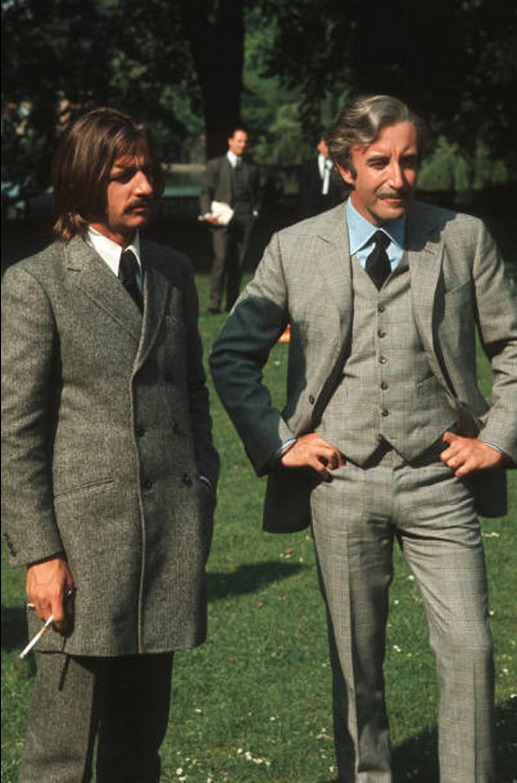
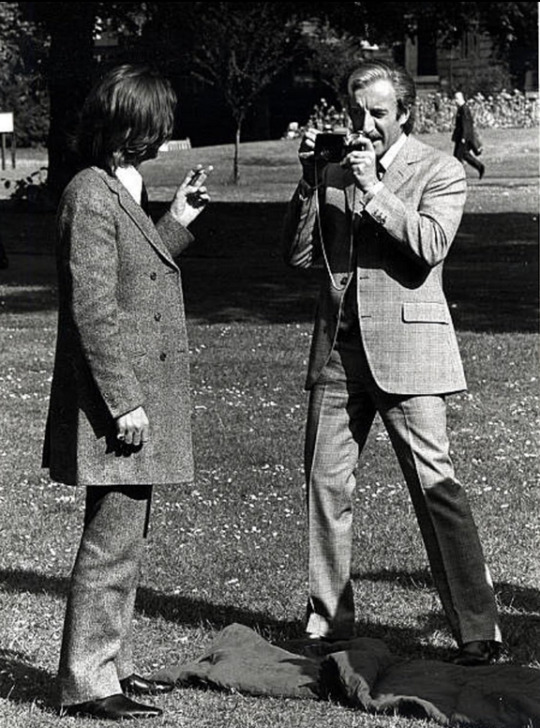
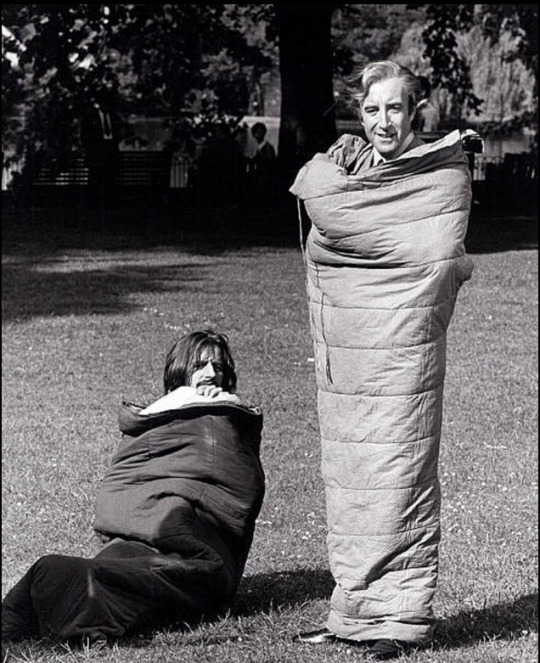
Ringo Starr and Peter Sellers in 'The Magic Christian' (1969)
125 notes
·
View notes
Text
"The Magic Christian" - queer moments
Thanks to @clueingforbeggs, I watched "The Magic Christian", 1969 comedy with Ringo Starr and Peter Sellers.
There is SO MUCH covert and overt gayness there… oh boy.
Let's start with the fact that Sir Guy Grand, played by Sellers, is an unmarried, childless, middle-aged man. He's also very sophisticated, which can kind of be considered queer coding? At the very beginning of the film, Guy goes to the park and meets a homeless man (played by Ringo); in the next scene they go to the office and Guy adopts him, giving him the name/nickname Youngman. Watch Guy tell this incident to his employees: at first he complains that he has no biological offspring, and then…
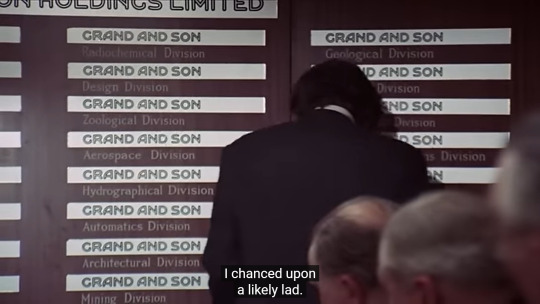
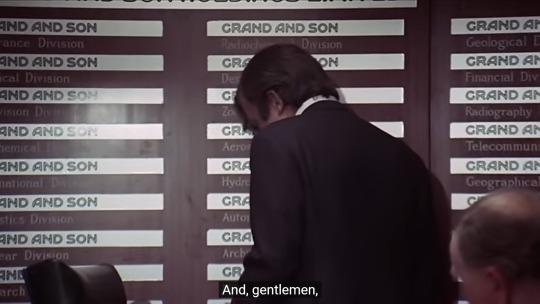
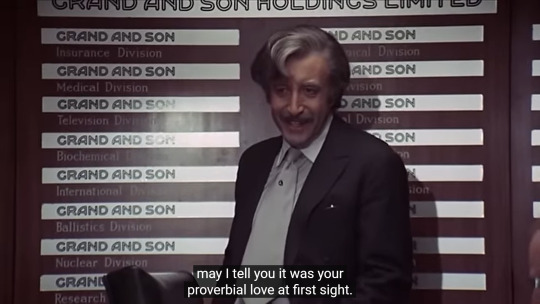
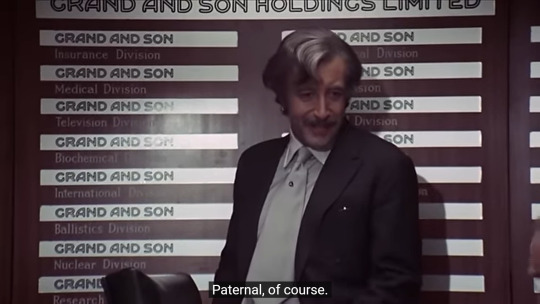
Then he introduces them to Ringo and then quotes an erotic poem? I mean, wtf? You guys are quite evident.
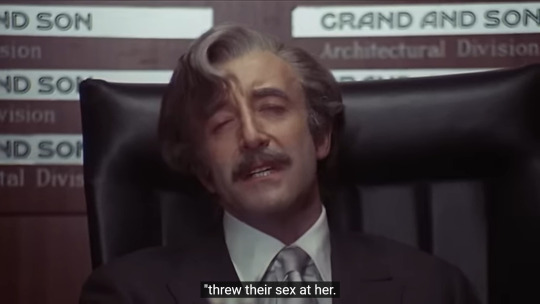
2. In one of the opening scenes, Guy and Youngman go to the theater. Unexpectedly, Hamlet starts doing a stiptease and it looks quite… gay. Guy is very excited, ecstatic even (he had previously announced that this was the best scene), and Youngman looks at the actor with satisfaction and curiosity.
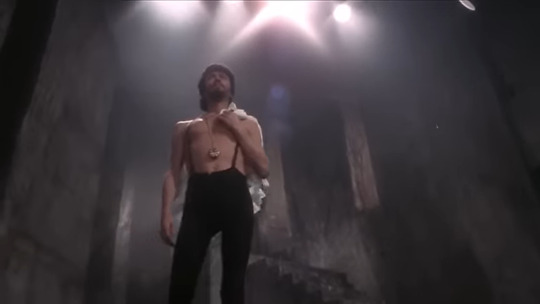
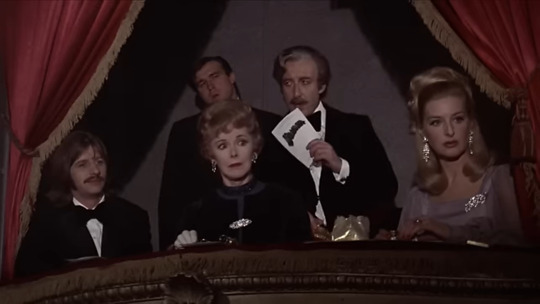
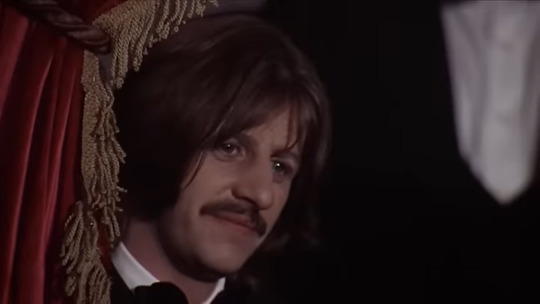
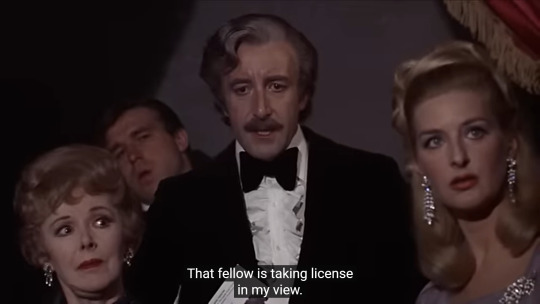
3. Basically, the plot is that Guy and Youngman are pranking different people. One of them is to pay two boxers whose fight will be broadcast on television to kiss each other on the lips. And they do it. And Youngman's reaction is fantastic.

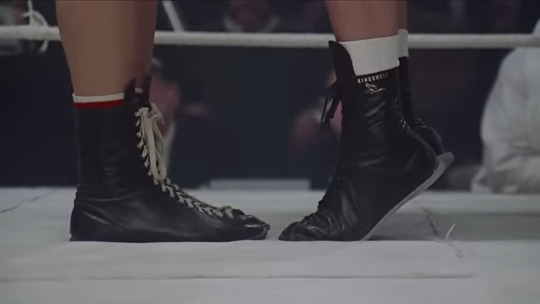
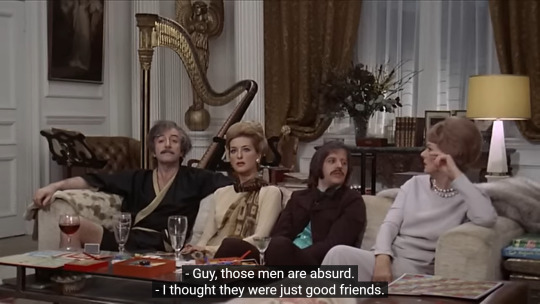
4. Near the end of the film, Guy and Youngman are sailing on The Magic Christian. Guy chats for a while with the man next to him, who turns out to be a racist. And in a moment THIS happens:
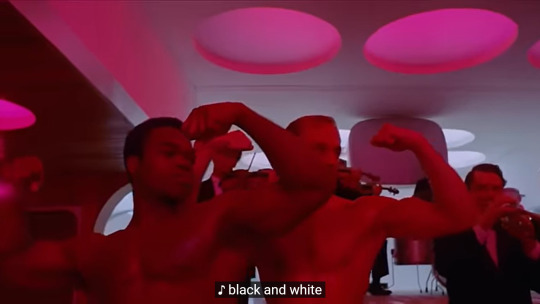
Yes, half-naked, muscular men appear. They hit on a racist to the rhythm of a Disney song. And Ringo whistles.
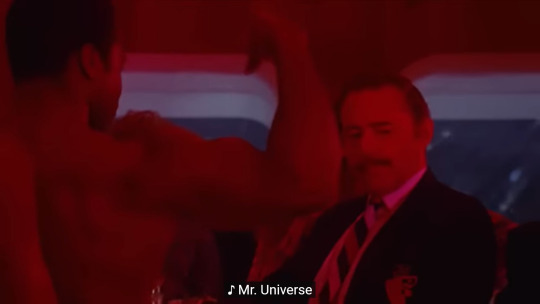
One of the travelers gives a piece of paper to the black dancer, who hides it in his underpants.
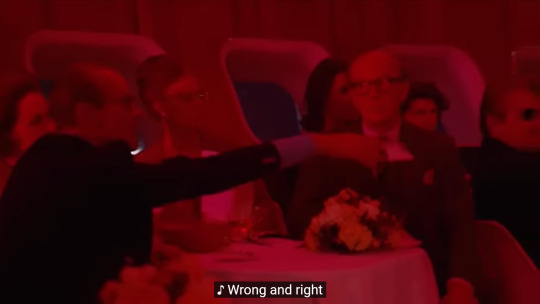
5. After another of Guy and Youngman's pranks, one of the passengers becomes very concerned. Laurence Faggot, a psychologist, comes to him and offers him a moment alone. This is the only queer moment in the film that is ugh. Faggot fits the stereotype of a pushy gay man.
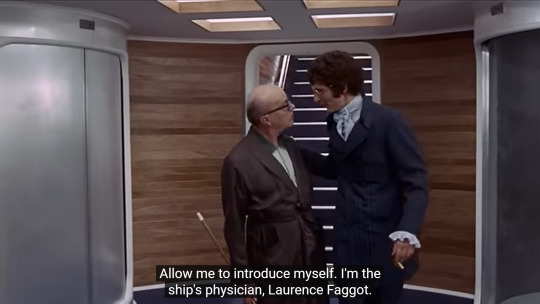
6. Then we see the half-naked queer men dancing that appeared in point 4. Youngman and Guy aren't the least bit surprised.
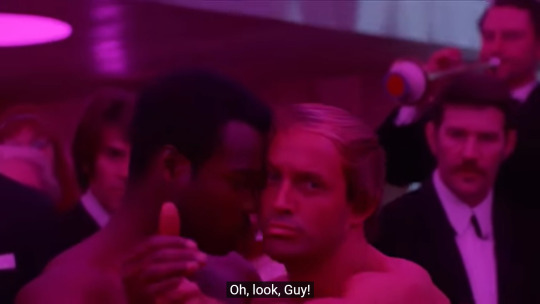
When Guy's sister screams in alarm, Guy responds:
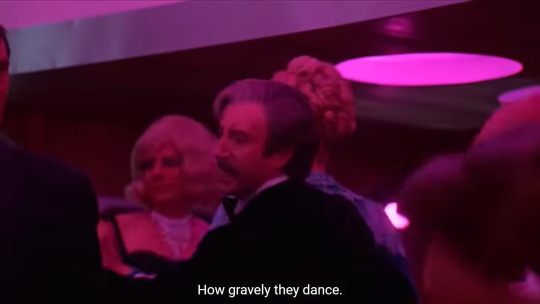
7. And this scene... looks a bit like a transgender woman's coming out? You have to see it yourself.
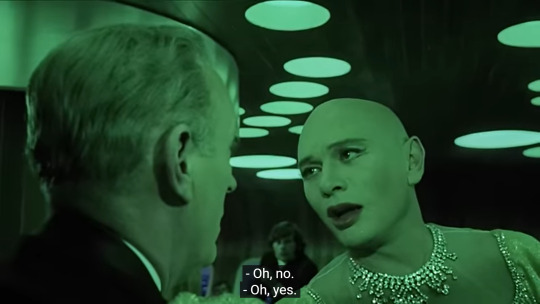
I can't believe how this all appeared in a 1960s movie. I really do. Of course, more comedy is allowed, but still.
38 notes
·
View notes
Text
John and Graham in the movie "The Magic Christian" (1969) :D


(btw I do recommend y'all to watch "The Magic Christian" (1969), which can simply be described as "Literal Acid Trip (fr): the Movie", which also stars Peter Sellers and Ringo Starr. Plus obviously John and Gray (+ Spike Milligan) cameo in the film, so be on the lookout for them!)
Also, I know these characters never actually shared any screen time together, but uhh I personally wanna ship them both <33 (that may also be due to the fact that I'm a John x Graham duo lover, like i just luv em together 💓!! Also, since these characters don't have any actual names in the actual film, imma headcannon their names tbh. For Mr Dougdale (I'm pretty sure "Dougdale" is his surname imo), i think he'd be called "Dennis" cuz imo it kinda fits in a way, so Mr Dennis Dougdale. For the Oxford crewman, I headcannon his name to be Oliver "Ollie" Cunningham, because uhh why not? (also cuz I literally took the first initials of "O" & "C" from character's name "Oxford crewman" lol, so uhh yeah). Ok uhh rambling over! Please do watch the film though, like fr it's kinda crazy but a surreal and funny kinda way. Also cuz Ringo Starr is in it :).
15 notes
·
View notes
Text
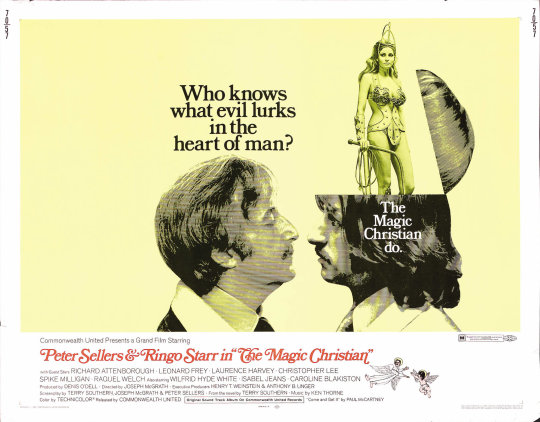
7/5/23
THE MAGIC CHRISTIAN, directed by Joseph McGrath, 1969.
10 notes
·
View notes
Text
if i made the magic christian (1969) fanart would you guys care
#it’s a below average movie unless you’re a sellers fan… or a ringo starr fan .#seriously the trailers are funnier than the movie#i didn’t realize until i watched the magic christian 1969 that i had actually been listening to badfinger’s album they made for the movie#i had been listening to that album for YEARS!!!
5 notes
·
View notes
Photo



@therealsaintscully, Paul means this promo photo


‘THE BEATLES ANTHOLOGY’ Book
1969-70
‘The Magic Christian’
Both sides of a letter Paul sent to someone Jack in relation to the cover of the single “Come And Get It” by The Iveys (later Badfinger) which would be in the soundtrack of the film.
Text:
Dear Jack
Will you get in touch with Bob Gill, who is working for Dennis O’Dell on the “Magic Christian” and ask him to give you a print of the photo they are using for their advertising on the film.
When you get it, have a photo session fixed up with the IVEYS, and arrange them exactly as Ringo and Sellars are in the photo. (Ringo is sitting on Sellars knee!)
So the Iveys will do it like this, side by side.
Then ask Bob Gill if he vill do the cover desing EXACTLY like the film posters except for the replacement of Ringo & Sellars with the Iveys So their advertising will be like this … Our cover will be like this … Just have the photo done - lettering to be decided later. Let me see it when it’s ready to go to the printers
Thanks
Paul
Note how Paul writes actor’s laste name as “Sellars”, not “Sellers”
#paul mccartney#anthology#1969#magic christian#iveys#badfinger#come and get it#ringo star#peter sellers
25 notes
·
View notes
Text

PAUL & LINDA McCARTNEY at Les Ambassadors Club in London at the party celebrating the completion of filming The Magic Christian. May 4, 1969.
191 notes
·
View notes
Text

PAULMCCARTNETY VISIT THE MAGIC CHRISTIAN SET, 4 MARCH 1969🌼🌼🌼
This photo and many more can be found here: https:// beatlesmagazinevideo.blogspot.com/ Visit BEATLES MAGAZINE PHOTO🌼🌼
Via @beatlesmagazine on Instagram🌼
#60s icons#girlsofthesixties#60s couples#the beatles wives#paul mccartney#linda mccartney#paul and linda#heather mccartney#ringo starr#the magic christian#1969
19 notes
·
View notes
Text


Ringo Starr on the set of 'The Magic Christian' (1969)
210 notes
·
View notes
Text

Paul & Linda McCartney at a party with Ringo & Maureen Starkey, John Lennon, and Yoko Ono, the party was for "The Magic Christian", May 4th, 1969.
❝ She was a very fun person to be with, very amusing and very witty. She had a great take on life, and of course she was very artistic. There wasn't a lot of sadness about her at all. She was an upbeat lady. ❞
- Paul McCartney talking about Linda.
#paul mccartney#linda mccartney#paul and linda#paul mccartney and wings#john lennon#the beatles#george harrison#thebeatles#ringo starr#wingsband#maureen starkey#yoko ono#party#1960s#circa 1969#heather mccartney#stella mccartney#james mccartney#mary mccartney
201 notes
·
View notes
Text

7 notes
·
View notes
Text
From The Library of Anne Rice (Part 1)
A list of books owned by Anne Rice including annotation information taken from auction listings at Bonham's, October 2024. Will continue in Part 2.

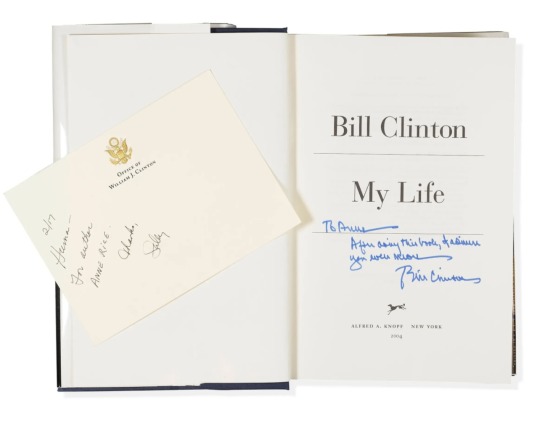
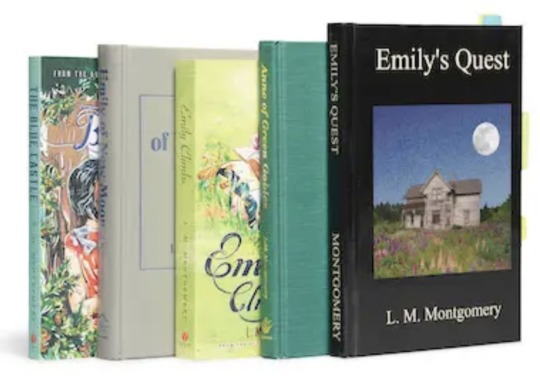

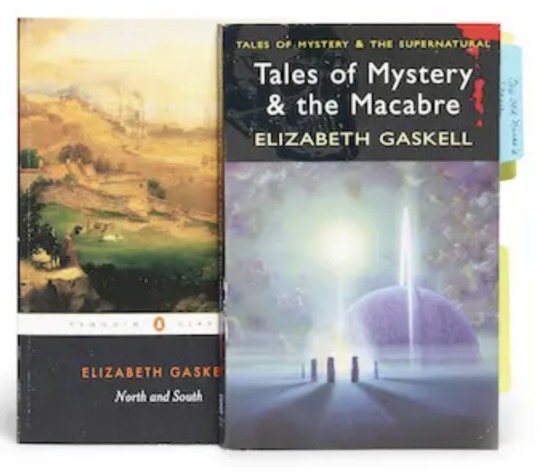
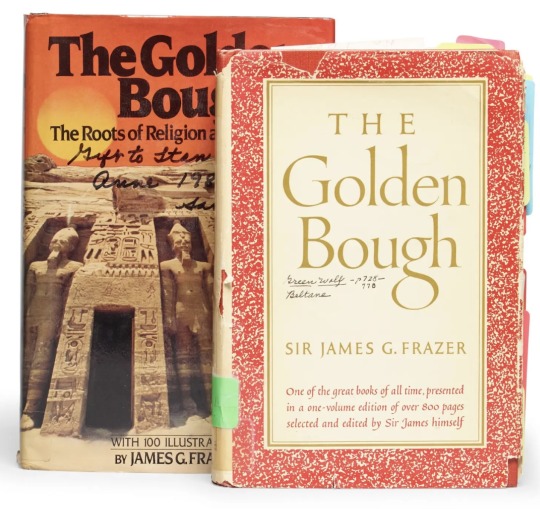
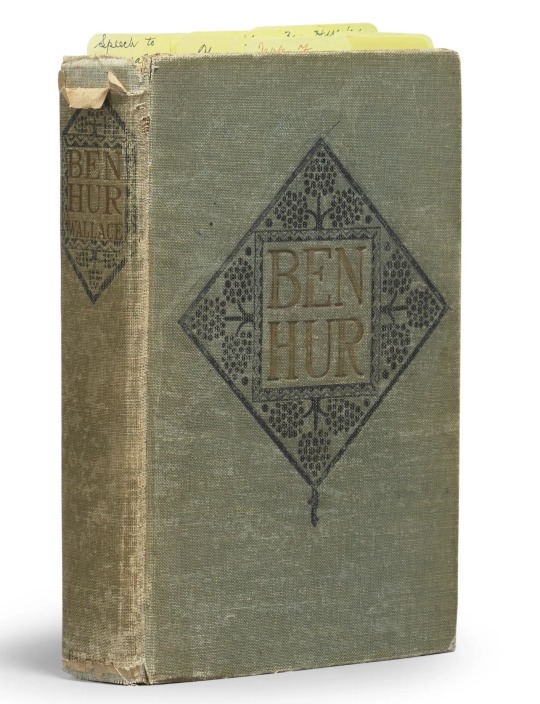
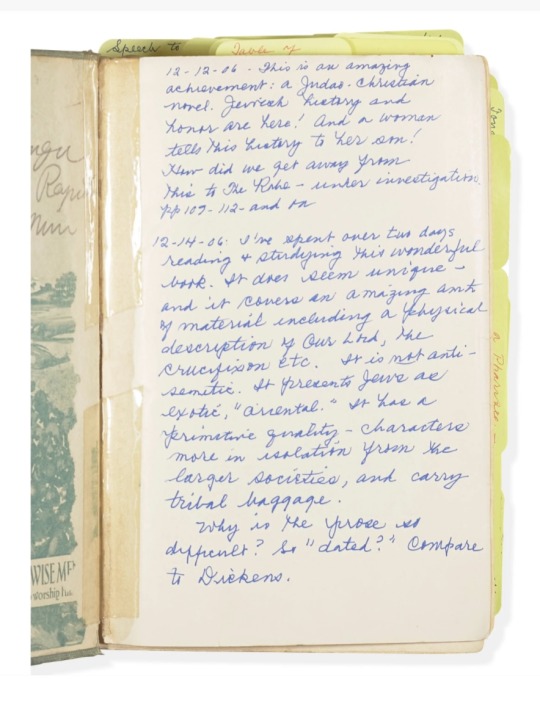
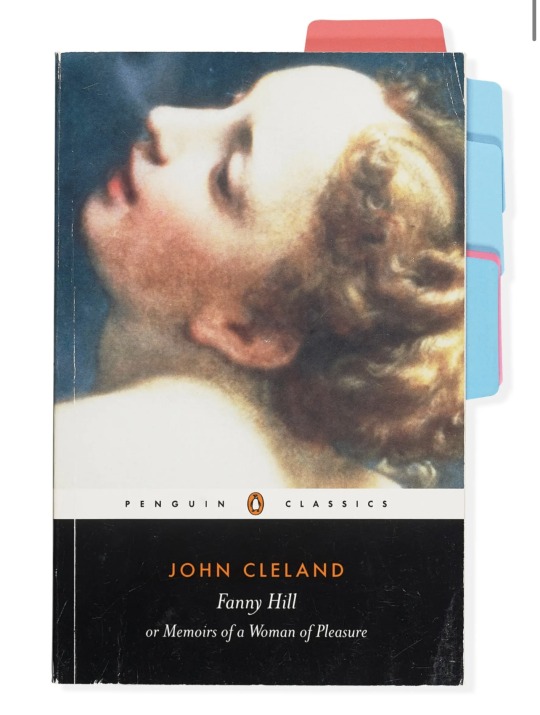
Frazer, James G. The Golden Bough: A Study in Magic and Religion (abridged edition).New York: MacMillan Publishing Co., 1963. She writes on the flyleaf in June of 2012: "When I bought this book I don't know. I know I read it or a copy of it in the 1980s when writing The Vampire Lestat. It is essential to me." On the jacket spine she has added "Sacred!"
Frazer, James G. The Golden Bough: A Study in Magic and Religion. 1981. Marked on the cover, "Gift to Stan from Anne 1985 / Save Always, AR," and internally reads in Stan's handwriting: "A gift to me from Anne because I've never read it."
Gaskell, Elizabeth. Tales of Mystery & the Macabre. Wordsworth edition, 2007. bears Rice's ownership signature to title page ("Anne Rice / May 29, 2012 / The Desert") and is tabbed and annotated throughout.
Gaskell, Elizabeth. North and South. Penguin Books, 2000. bears her ownership signature on the title page.
Hemingway, Ernest. For Whom the Bell Tolls. New York: Charles Scribner's Son, 1940. Original beige cloth stamped cover and spine, in facsimile dust jacket. First edition with the Scribner's "A" on the copyright page. With Post-it note to front pastedown indicating that the book was a gift "From Becket and Christina / Christmas / 2012."
King, B. B. & David Ritz. Blues All Around Me: The Autobiography of B.B. King. New York: Avon Books, 1996. First edition, inscribed to "To Anne / All the best to you / B.B. King / 10-18-96."
Montgomery, L.M. Anne of Green Gables. Cutchogue, NY: Buccaneer Books, 1976. Anne Rice ownership signature dated February 7, 2015, Palm Desert. Annotated on front pastedown; "It's immediately a pleasure, and making me want to write."
Montgomery, L.M. Emily's Quest. Oxford City Press, 2009. Anne Rice ownership signature dated February 21, 2015; annotated and tabbed.
Montgomery, L.M. Emily Climbs. Sourcebooks, 2014. Anne Rice ownership signature dated February 12, 2015.
Montgomery, L.M. Emily of New Moon. Ameron House, c.2015. Anne Rice ownership signature dated February 6, 2015, inscribed: "Reading the paperback and loving it so much I had to have a hardcover."
Montgomery, L.M. The Blue Castle. Sourcebooks, 2011. Anne Rice ownership signature dated May 12, 2015 to title page.
Puzo, Mario. The Godfather. New York: Putnam, 1969. Book club edition. On May 26 and 27, 2013, she writes, "Badly need this, Studying in detail" and on page 74 she writes, "Note how easily it flows." She has great praise for the nimbleness of the novel's p.o.v. and is often asking herself "how can I learn from this?" On p 225 she writes, "This is a most impressive piece of work and is masterly. Again I marvel at vocabulary, tone, and placement—organization of the book. I fight OCD as I write, I've come to see that, and this helps me to see what this novel accomplishes. Presenting the Don as a 'great' man, a 'genius,' without apology is a conscious approach that is so powerful."
Puzo, Mario. The Godfather. Another copy, later edition, lacking jacket. With Anne Rice's ownership signature.
Puzo, Mario. The Godfather Papers and Other Confessions. London; William Heinneman, 1972.
Puzo, Mario. The Fortunate Pilgrim. New York: Random House, 1997. Anne Rice ownership signature.
Wallace, Lew. Ben-Hur: A Tale of the Christ. New York and London: Harper & Brothers, 1908. Anne Rice re-read this copy of Ben-Hur in 2006, a used copy she picked up somewhere, leaving detailed marginalia throughout and summing up her thoughts on the first flyleaf: "12-12-06: This is an amazing achievement: a Judeo-Christian novel. Jewish history and honor are here! And a woman tells this history to her son! How did we get away from this to The Robe ... 12-15-06: I've spent over two days reading & studying this wonderful book. It does seem unique—and it covers an amazing amt of material including a physical description of Our Lord, the crucifixion, etc. It is not anti-semitic. It presents Jews as exotic, 'oriental.' It has a primitive quality ... why is the prose so difficult? so 'dated'? Compare to Dickens." Rice's notes in the margin often compare the novel to (presumably the 1959 version of) the film, finding the novel superior in every way, and commenting more than once on its structural similarities to Dickens: "the whole spectacle and the co-incidence" (p 166).
Cleland, John. 1709-1789. Fanny Hill or Memoirs of a Woman of Pleasure. New York: Penguin Books, 1985. Annotated and with ownership signature to the title page: "Anne Rice / January 2014 / Palm Desert." Rice underscores Cleland's descriptions of bodies and physical acts, and in particular, wonders about the novel's p.o.v.: on p 108 she writes in the margin, "Is this a man's view? A gay man? An author who is male and female?"
Clinton, Bill. Born 1946. My Life. New York: Alfred Knopf, 2004. Jacket spine with label "From the library of Anne Rice" laid down to tail. First edition, inscribed on the title page, "To Anne—After doing this book, I admire you even more—Bill Clinton." with: a note on the Office of William J. Clinton letterhead: "2/17 —Huma—For author ANNE RICE.—Thanks, Sally." When Clinton published his memoir in 2024, Rice was one of the VIPs to receive a presentation copy, in which he expresses his admiration for her work after having written a book of his own.
Bellman, Henry. 1882-1945. Kings Row. New York: Simon and Schuster, 1943. Annotated and with ownership signature to front free endpaper: "Anne Rice / June 27, 2013 / Palm Desert." Rice has carefully read and annotated this copy, complementing the writing (particularly when Bellamann writes about Father Donovan) and adds a long note on the rear pastedown: "Pages & pages of this book are about the mind—about how the mind learns, expands, grows, experiences." Sometimes her comments are in conversation with the text, as when, on p 153, she underlines the town of Auvergne and writes "Auvergne, what a coincidence! As I plan a trip there and write about Lestat!"
Dickens, Charles. David Copperfield. New York: Penguin Classics, 2014. With ownership signature of Anne Rice dated June 11, 2018, tabbed and annotated throughout. On the preliminary leaf of Copperfield, Rice writes, "Again with my beloved David, and my beloved Dickens. I have just read Claire Tomalink 'The Invisible Woman' and her later bio of Dickens. I'm writing my new novel in my head."
Dickens, Charles. Great Expectations. New York: Penguin Classics, 2008. Signed and dated June 15, 2018, tabbed and annotated throughout.
Rawlings, Marjorie Kinnen. South Moon Under. New York, London: Charles Scribner's Sons, 1933 (undated later facsimile edition).
Mitchell, Margaret, Gone With the Wind. New York: [Simon and Schuster], 2011. Rice reread this copy in March of 2015, tabbing dozens of pages and commenting in the margins.
Tolstoy, Leo. War and Peace. New York: Alfred Knopf, 2007. The first date on this copy of War and Peace is June 30, 2010, and Rice writes: "The Desert / Being reborn in Tolstoy, studying at his feet—Searching for the Christ who is bigger than religion." In a different ink, Rice adds at the top of the same page, "Revisiting 7-16-17—Having seen much of the new BBC series with Lily James as Natasha." Rice has tabbed the pages throughout this volume and made extensive notes on character development and theme. On the rear flyleaf, she adds, "'Life is everything...' p 10064— use for L" as well as "The guiltlessness of suffering (do we make ourselves suffer to be guiltless)?"
Tolstoy, Leo. Anna Karinina. Translated by Rosamund Bartlett. Oxford: Oxford University Press, 2014. Signed and annotated February 19, 2015. Heavily tabbed, especially in the center part of the novel, and noted on the front flyleaf: "Reading chunks of the story of Levin & Kitty / So beautiful and smooth—"
34 notes
·
View notes
Note

(tags by @anythingcanhappeninmay )
You’re very welcome Sir @anythingcanhappeninmay <33 !! (Plus to anyone else also reading who is ALSO on a Quest to Watch Every Graham Chapman Film Ever™️ !!)
I thought it’d be helpful to put out this (mostly) comprehensive list as not only to help out people to search out all the Non-MP films that starred Graham (whether the films in question are well known and/or obscure), but also experience films that they may not have heard of/about before!
Also hoping this will help out the Graham Chapman Completionists (myself included) out there too with this list as well!!
Here’s a list of Non-Monty Python movies starring Graham Chapman in either a main character role and/or a minor character role and/or at least a major character role (at least from what I could find lol) as a helpful lil guide for your Quest to Watch Every Graham Chapman Film Ever™️
Here is the comprehensive list in chronological order! :
The Magic Christian (1969) (Graham Chapman as Oxford Crewman (minor role))
The Rise and Rise of Michael Rimmer (1970) (Graham Chapman as Fromage (minor role))
Doctor in Trouble (1970) (Graham Chapman as Roddy (minor role))
The Statue (1971) (Graham Chapman as Newsreader (minor role))
The Odd Job (1978) (Graham Chapman as Arthur Harris (main role))
Yellowbeard (1983) (Graham Chapman as Captain Yellowbeard (main role))
Still Crazy Like a Fox (1987) (Graham Chapman as Detective Inspector Palmer (major role))
Hope this list was/is helpful! And incase I’ve missed any other films/stuff ALSO starring Graham Chapman, do let me know as that would be soso kind and helpful of you and anyone else reading this frfr!!
^^ helpful list for any other completionists like myself <3
#graham chapman#monty python#graham chapman films#completionist#the magic christian (1969)#the rise and rise of michael rimmer (1970)#doctor in trouble (1970)#the statue (1971)#the odd job (1978)#yellowbeard (1983)#yellowbeard#still crazy like a fox (1987)#obscure films#lists
12 notes
·
View notes
Text
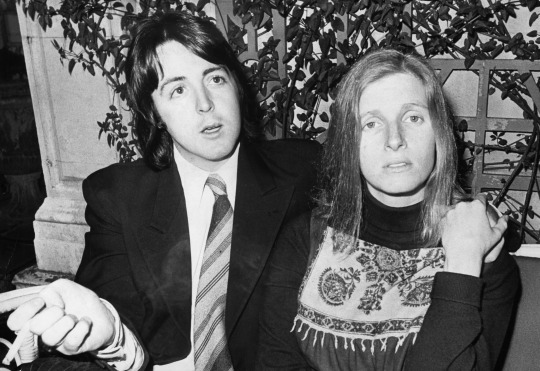
PAUL and LINDA McCARTNEY at Les Ambassadors Club in London at the wrap party for THE MAGIC CHRISTIAN. May 4, 1969.
#NEW PAUL AND LINDA PIC!!#i am so happy!!#look at them!!#and lin is expecting mary during that time#funny how paul would deny her pregnancy in the interview jnaskjasjas#i get it he didn't want the press up on them X(#paul mccartney#linda mccartney#1960s#60s#1969#the beatles#my edits#my edit#technically is an edit because where i got this i screencapped it because hq supremacy!
227 notes
·
View notes